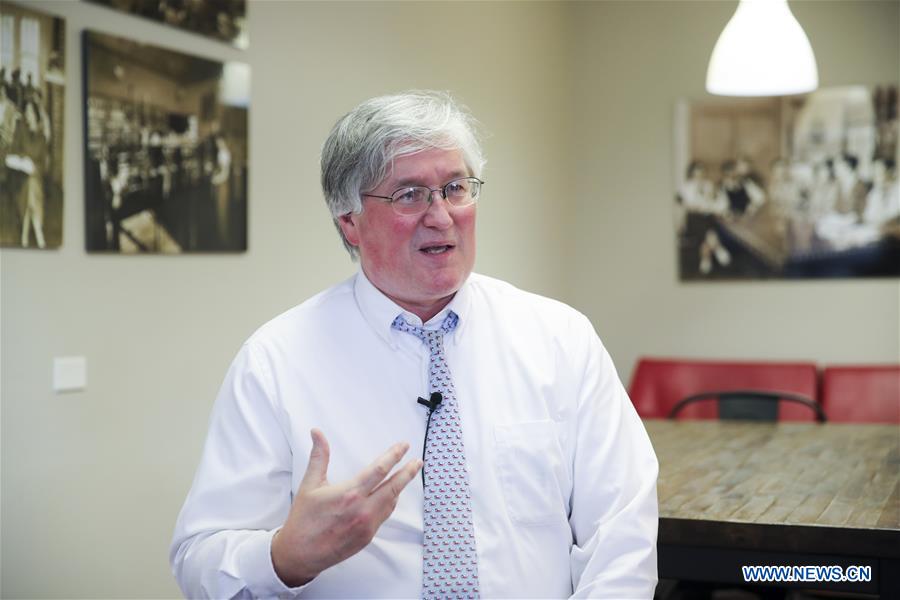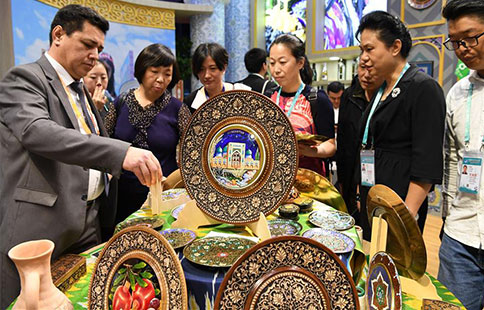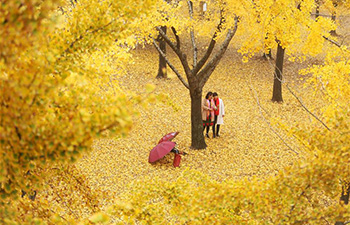
Jon R. Taylor, professor of political science with the University of St. Thomas, receives an interview in Houston, Texas, the United States, Nov. 7, 2018. Voters' desire for more balanced representation in the Congress has enabled the Democratic Party to gain two seats of the House of Representatives in Texas in the U.S. mid-term elections held on Tuesday. (Xinhua/Wang Ying)
by Xinhua writers Liu Yanan, Gao Lu
HOUSTON, Nov. 7 (Xinhua) -- Voters' desire for more balanced representation in the Congress has enabled the Democratic Party to gain two seats of the House of Representatives in Texas in the U.S. mid-term election held on Tuesday.
Covering western part of Houston and some suburb areas, the 7th District has long been held by Republicans since it was recreated in 1966.
The 43-year-old corporate lawyer Lizzie Pannill Fletcher unseated nine-term incumbent John Culberson in Texas' 7th District by 52.35 percent to 47.65 percent, according to data released by Harris County early Wednesday.
"The majority of Americans agree on so many things, but we have a deeply divided Congress that won't get to work on solving our problems," said Fletcher citing immigration and gun control as examples.
Fletcher said she is willing to work with anybody, who has got a good idea that's going to help solve problems.
"We need to be bigger than partisanship, think about the people we represent and put the people first," said Fletcher after declaring her victory Tuesday night.
VOTERS EXPECT CHANGE FOR GOOD
Some voters in District 7 and District 2 told Xinhua that they want to have some changes in the Congress with political division, immigration, healthcare and jobs in the mid-term election.
"I hope my vote at least count for something to make a change. I'm doing that for my community, people who can't vote," said Ms. Silva after casting her ballot at a polling station in District 7 of Texas. Silva, who is in her 20s and now takes care of her baby at home, said that she wanted a positive change for her community, where help is in need.
"I voted for either party. I'm not either Republican or Democrat. Just whatever the person does the right job is the person you should vote for," said Ms. Rosales, who voted at a polling station in District 2 accompanied by her husband and her daughter.
Once working in the field of finance and having not participated in voting for around eight years, Ms. Rosales said she hoped that she made a good choice for America or for the state of Texas by voting.
"I thought it was really important for me to vote this time. I feel like it's an obligation that I have to do that I haven't done in past," she said.
"I'm afraid of the situation for this country, especially the Republican Party and the President we have in the White House. I feel like he was doing a lot of bad decisions for the country and I don't think that will be continuing for the future and I wouldn't have a change," said Mr. Winer, who is self-employed in the transportation business.
"Healthcare was on my mind," said Ms. Faria, a stay-at-home mother, just recently renewed her Obamacare. Speaking outside a polling station in District 7, Faria said she hoped to continue to get good health care.
EXPERTS CONCERNED ABOUT POLITICAL DIVISION
Still, experts are more pessimistic about the political and social division.
The election of a number of Democratic candidates in Houston sends a message that the Democrats are back since they are out of power in Texas for over 24 years, said Jon R. Taylor, professor of political science with the University of St. Thomas in Houston on Wednesday.
What will likely happen from the House of Representatives is a series of investigations from the Russians to President Trump's taxes, according to Taylor. "You will likely see any sort of opposition to Trump's budget, which means he'll have to compromise" Taylor told Xinhua.
He said lack of trust toward institutions, the President, the Congress and the courts create instability and we may see more instability in American society.
"Donald Trump would face an uphill battle to win reelection. He will do his absolute best to continue to be divisive, to be controversial and to set one group against the other," Taylor said.
Compared with the rest of Texas, Houston is more open for different issues due to a huge concentration of universities and colleges, according to Peter Li, associate professor with College of Humanities and Social Sciences under the University of Houston-Downtown.
"I'm sure the division of the country will continue and especially, among people in education and in the media. The so-called American elites disagree with Donald Trump and it's largely because of what he stands for and, of course, the way he deals with the society and policy issues," Li told Xinhua on Monday.
"The evidence accumulated over the last 20 years indicates that now people themselves are starting to move toward more extreme positions," Michael Hout, professor of sociology with Department of Sociology under New York University.
Though around 40 percent Americans see themselves as moderate, but it's no longer the majority, according to Hout.











